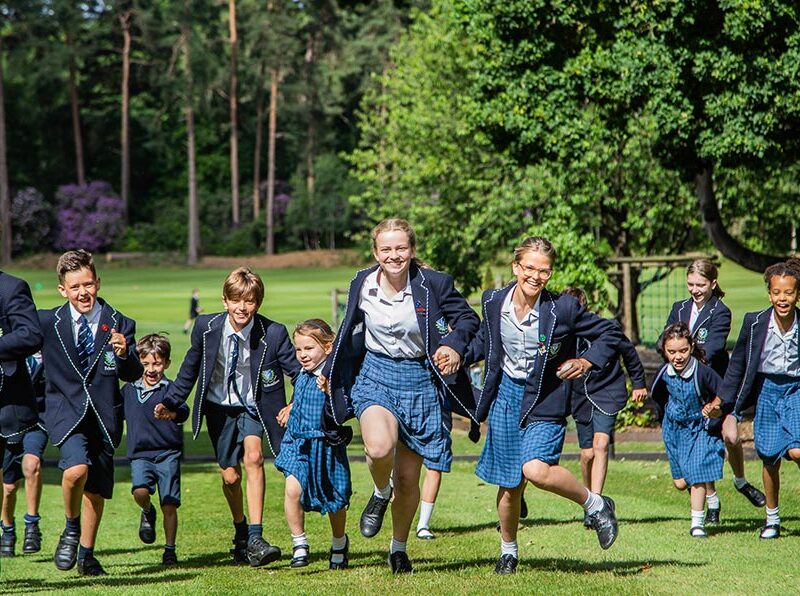
The impact of lockdown on learning
The impact of lockdown on learning
The effect of school closures on education and family life – experts look at how to get families through our uncertain times
The closure of schools and the uncertainty about public examinations is a major worry for many families, and so The Really Helpful Club is hosting an event on February 5 to offer some help at this trying time. Here, two experts from the panel offer some insight into two of the biggest problems we are facing.
Tash Rosin, founder of Teatime Tutors, has some advice on how to get through homeschooling. And Matthew Curnier, founder of Capital Tuition, looks at how to motivate secondary school children to study.
Matthew Curnier, Capital Tuition Group: To Study or Not to Study?
That is the question on everyone’s mind, and the answer lies firmly in the first two words. Many thought this year would be a fresh start, but on Monday 4th January the government announced national school closures and cancelled summer exams – for the second year running. 2021 seems like Ground Hog Day. “How are students to be awarded grades? Will CAGs (Centre Assessed Grades) be used? Shall I continue to study… or not?” These are some of the questions being asked by parents whose children are receiving academic support with Capital Tuition Group.
And these questions will remain largely unanswered until the government makes a formal announcement. Understandably, this leaves parents and students in limbo. If low motivation and anxiety seem to feature on your Monday Period 1 timetable, you are not alone. Home-schooling in yet another lockdown feels more like trying to get through the last week of the winter term before the Christmas holidays, except Christmas may or may not happen.
But there are some known quantities in this equation that may reveal why the answer is: Study! The talk of “mini-exams” set by exam boards, delivered and marked by teachers is likely to have spread far by now. While this is only supposition, it certainly seems to be a plausible plan and one that could be widely implemented by schools and colleges to derive CAGs.
Secondly, the government has said that it won’t be using computer algorithms to moderate any grades awarded by schools. This means that teachers’ judgement will play an enormous role in determining individual grades. It would be prudent that for any learner wanting to achieve a particular grade, to consistently return their assignments at the appropriate standard.
However (and thirdly), leaning on teachers to provide final grades poses a slight problem. In many cases, teachers simply don’t feel they have sufficient data on their cohorts to make reliable predictions of grades. Let’s take your average GCSE student. Last year, in Year 10, their teachers will have taught them for 5 months in the normal way. In this time, they may have had a few, quick progress tests but it is unlikely that they would have undergone any rigid summative assessment. The rest of year, seen out by home-schooling, saw scant opportunity to collect data about this student’s attainment. Now in Year 11, our student returns in September 2020 to a relatively turbulent term of learning, where despite incredible efforts to implement COVID safety measures, managing a series of consecutive lessons is challenging enough, let alone executing some form of assessment.
Teachers will, therefore, want to ensure they have a body of evidence to indicate what score to attribute a student before submitting the all-important grade. As such, they will most certainly be setting some form of summative tests in the summer months. So even if mini-exams aren’t implemented, it would seem judicious to keep on studying in preparation for the likely eventuality of internal assessments.
“At the end of the day, you put all the work in, and eventually it’ll pay off.” This quote, by the comedian Kevin Hart, resonates but the second half of the quote brings home the message; “It could be in a year, it could be in 30 years. Eventually, your hard work will pay off.” Our GCSE student may have experienced disruption aplenty but will likely go on to higher and further education. So, the work they put in now will assist them when facing new academic challenges. It will, eventually, pay off.
The Ground Hog Day of home-schooling seems never-ending, the exam end goal, elusive. And there is an injection of light at the end of the tunnel – even Ground Hog Day finished repeating itself. But it still came with a test.
Tash Rosin, Teatime Tutors: How to alleviate homeschooling anxiety
During these unprecedented times it can be difficult to remember that you are doing a brilliant job. Your child or children are safe and well and that is because of you. You are not home schooling; you are supporting their learning at home; your child’s teacher is doing the schooling; they are the qualified teacher, but your support is invaluable and much needed.
Here are a few hints and tips for you to help you and your child try at home that will hopefully alleviate any current anxiety you may be feeling.
- Designate an area that is your child’s learning area. Ensure it is quiet and think about purchasing some headphones so that any external noise is muted or silenced. Once this area has been defined, keep it. Children will associate this space with where they are learning, and the consistency will help them study.
- Eliminate the problems that are stressing you out. If you have to print work, make sure you have printer ink and paper. Ask your teacher to send out the following day’s work the night before if they can.
- Be prepared to assist your child, but do not do the work for them. This helps no-one and the teacher will have no idea what your child can or cannot do. If your child is really struggling, let their teacher know and submit their work regardless.
- Create a visual timetable – children like and are used to routine and this sets up their day, so they know what they are working towards or what is coming up on that day. The Times Educational Supplement have some for free. Build in breaks for them, we all need a break from our computers; let them have time between their lessons to gather their thoughts, have a snack or go to the loo. They do this at school so let them at home.
- Be consistent – find the pattern to the day that suits you and your family environment and stick to it. The more your child does this, the more open they will be to focusing on their schoolwork.
- Communication is key. Communicate with your child. Ask them how their day was, how were their lessons and what did they learn? Ask them if there was anything they didn’t understand and what or how their day could have been better and communicate with the school.
- Get your kids outside. They need the fresh air, and they need to let off steam. Please try and make sure they get a good run around regardless of the weather. Add this into their timetable so they are working towards their outdoor time.
- Schedule in 30 mins of quiet reading time daily. Your child can use a Kindle, a paper book, read a magazine, but it is an important part of their day and hopefully also give you 30 minutes peace. Remove any distractions so they must focus on this one task. Make this totally independent and daily – get them into the routine of it and be consistent.
- Allow them time to talk to their friends. Either on the phone, using House Party or on Zoom. They need to socialise with their friends and talk nonsense; they do this in school so there’s no reason they shouldn’t be doing it now.
- The wider curriculum – if your child loves the subject Space, let them do a project on it. If they like gardening, ask them to plan a garden, draw a scheme, add colours….if they like cooking, they could produce a cookbook. There are so many ways to keep their minds active; let them do what they like doing, they will be happy and occupied and they will still be learning.
- Tutoring – if feel you need some extra support, call in a tutor. Treat your tutor a bit like a personal training session. Get them in for a few sessions to support or boost subject knowledge and confidence. All tutors out there are fully prepared for these types of calls and are willing to help, whether it’s for a few weeks, a month or longer. You would call a PT in to build some muscle so call in a tutor to help your child.
Finally, take care, stay safe and remember you are doing amazingly well.
Sign up for the online talk here. Friday 5 February 2021 at 11am. Featuring Alicia Drummond, adolescent therapist and founder of Teen Tips, which works with schools, parents and organisations to help them create environments in which young people can thrive, Tash Rosin, founder of Teatime Tutors, who offer bespoke tuition for children 7-11 years old and Matthew Curnier, founder of Capital Tuition, which is a collective of teachers that provide tuition for secondary school children.
Adds: Caroline Edwards, Events Director of the Really Helpful Club: “All of our events at the Really Helpful Club are driven by the needs of our members. We listen carefully to ascertain the problems that our members are facing and we create events to help. The closure of schools and the uncertainty about public examinations is a real challenge so we drew from our amazing Education experts to form a panel to discuss how families can help their children..”
If you miss the live event, please contact caroline@reallyhelpfulclub.com for the recording.






